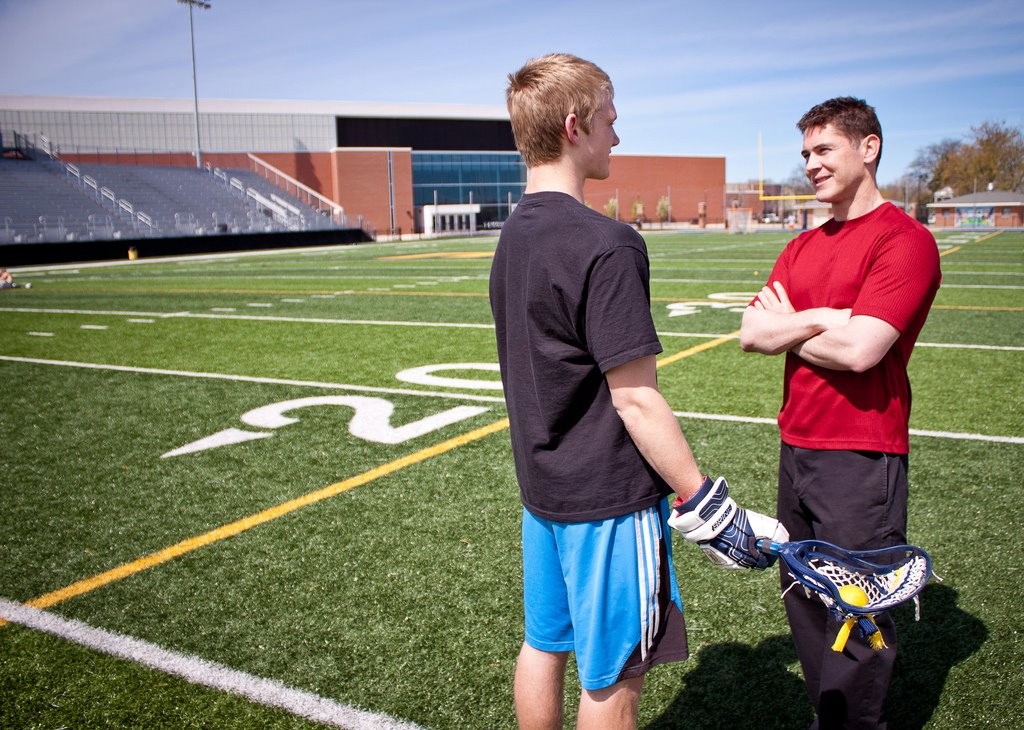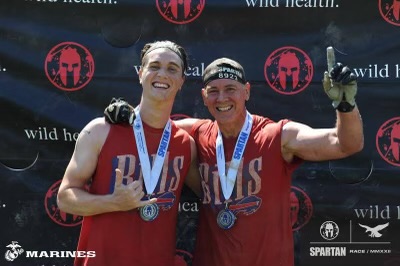We caught up with the brilliant and insightful Eddie O’Connor a few weeks ago and have shared our conversation below.
Eddie, thanks for joining us, excited to have you contributing your stories and insights. Was there a defining moment in your professional career? A moment that changed the trajectory of your career?
I was a runner in high school. That was my identity, which was risky because I wasn’t that fast. But I loved the sport and trained year round for four years.

I hit a mental block senior year. I desperately wanted to break 2:10 in the 800m before graduating (I told you I wasn’t fast!). But week after week I came across the finish line in 2:11. I ran as fast as I could but I still had energy left. Something was holding me back. I’d come across the finish line, go over to the sideline and throw up as if I had pushed myself to exhaustion, but at the same time also know that I had more in me and would say, “Ugh, I could’ve broken 2:10 if I just pushed a little harder.”
It wasn’t until I went to graduate school for clinical and sport psychology that I figured out what happened to me.
My identity was wrapped up in my performance. Not meeting my goal was a tremendous psychological threat.
By not giving 100% and coming across the finish line in 2:11, I didn’t fail. I had an excuse. I was not the failure. I simply didn’t execute thereby keeping hope alive that I could run faster. I could change my effort but not my talent or who I was.
This mental block was an attempt to protect me from definitive failure. I was weighed down by this question, “what if I gave it my all and still failed to break 2:10?!?” It felt devastating. So my unconscious mind prevented me from giving it my all to test that question. It protected me from that devastating feeling of ultimate failure.
Unfortunately, each week it also prevented me from succeeding.
It ends well, though In my very last race I came across the finish line in 2:09.
But I still wonder what I could have done if I had been willing to risk it all. My training was great in effort and consistency. Could I have broken 2:05? Even a 1:59? Unfortunately, I’ll never know.
It is this experience that helps me understand my athletes struggling with performance anxiety. For those with a strong athletic identity, winning and losing can determine our worth. And that pressure hurts our performance.
I wish I had answered my “what if I don’t break 2:10?” question. Because if I did I would have realized that who I was wouldn’t have changed. My friends and family would still love and support me. I would have felt very disappointed and sad, and I could have handled those feelings. These answers would have relieved the pressure and I would have run faster.
So please know this … You are more than your accomplishments. You are more than the wins and losses, your position on the team, your body shape and size, your job title, your income. These are things you do, not who you are. Your value is so much more than that.



Eddie, love having you share your insights with us. Before we ask you more questions, maybe you can take a moment to introduce yourself to our readers who might have missed our earlier conversations?
As both a clinical sport psychologist and Certified Mental Performance Consultant, I help high achievers (athletes, performing artists, business men and women) overcome obstacles to excellence. I specialize in injury rehabilitation and performance anxiety.
Do you:
– perform better in practice than in competition, not living up to your potential?
– perform even worse after mistakes?
– identify as a perfectionist (and that pressure hurts you)?
– play inconsistently?
– struggle with motivation or commitment to training?
– have anxiety or depressive symptoms following injury?
– fear re-injury or lack trust in your healed body part?
– experience performance anxiety with “what if …?” thinking or overthinking?
– compare yourself to others and fear you don’t measure up?
– get distracted by the score, or rankings, or pressure of expectations?
– fear letting coaches, teammates or family down if you lose or make a mistake?
If you said yes to any of the above, I can help!
Unlike what you’ve heard in popular psychology, I do not believe in positive thinking! If it works, great. But often it doesn’t – and for good reason. Sport (and life) is filled with adversity. And success is on the other side of this hardship. I train high-performers how to be their best under pressure.
I provide one-on-one teleheath consulting where you will receive a personalized mental training program to overcome the mental and emotional obstacles that get in your way. Details are at www.dreddieoconnor.com/telehealth-services
In Success Stories Membership, You can watch video of the same lessons I provide to my individual clients at your own pace and convenience. At only $29/month this is an extremely cost-effective option with additional bonuses such as monthly Team Meetings on Zoom and members-only mindset videos. Learn more at www.dreddieoconnor.com/membership
Sleep is our #1 performance enhancer. Yet most of us do not get enough sleep to be our best. If you want to sleep better today so you can play better tomorrow, check out my “Sleep Your Way to the Top” mini-workshop at bit.ly/sleeptotop
I love presenting to teams and organizations. Every presentation includes an inspiring message and practical exercises that you can implement right away to improve your performance. Check out www.dreddieoconnor.com/speaking and bring me in to help your entire group.
If you would like to personally lead your team in mental training but don’t know where to start, check out my “Mental Training Camp.” Four lessons including 13 videos, discussion questions and worksheets, and physical exercises to train the mental game during your usual practice sessions. Go to bit.ly/Mental-Camp for more on how to help your team manage distractions, perform under pressure, overcome performance anxiety, and rebound from mistakes.



What’s a lesson you had to unlearn and what’s the backstory?
My tag line is “overcoming obstacles to excellence” but that wasn’t always the case. My early business cards read “… because average isn’t good enough.”
At the time, I was proud of it. I was the “performance excellence” guy, so of course average wasn’t good enough! I wanted to help people be their best and not settle for anything less. But as I explained earlier, some of that came from an unhealthy place. An intensity that was fueled by a feeling of not being good enough and a need to earn my worth through achievement.
It worked in the beginning. As all successful people will tell you, the achievement, recognition, admiration and promotions are all positive and reinforcing, But they are also short lived. The “I am good enough” feeling doesn’t last. Then it is on to the next project or achievement to get that feeling again. It becomes a treadmill of constant running but not getting anywhere. It’s exhausting.
A life fueled by “not feeling good enough” risks getting out of balance. With the desire to achieve, people work harder and neglect family, health, recreation and recovery. Mental health suffers with depression and anxiety. The pressure to win becomes all-consuming.
My clients struggling with performance anxiety have all this in common.
I realized I was sending the wrong message. I looked at my business card and tore it in half.
By stating average wasn’t good enough, I was shaming those who didn’t win … which is most of us most of the time! It is absolutely the wrong focus. I don’t want my clients running away from negative consequences.
I want them running toward their life-giving goals.
I like to do this exercise called the “Retirement Dinner.” I ask, “what do you want people to say about you when you are all done with sport?” Clients list attributes like being known as a hard-worker, a leader, a great teammate and other admirable qualities. Very few list their win-loss record or batting average or race times. I’ve found that when we focus on these character values each day, we decrease our anxiety and improve our performance at the same time.
I learned that it isn’t the outcome that matters most. It is the process we take to get there.

Training and knowledge matter of course, but beyond that what do you think matters most in terms of succeeding in your field?
I firmly believe that sports psychologists have to “practice what we preach.”
Excellence, by definition, is difficult. Otherwise everyone would be excellent and then no one would be because it became the norm.
There is a process to achieving excellence that can and must be practiced. I believe that as performance psychologists, we cannot simply teach these skills. Rather we must apply and practice them in our own lives. Things like mindfulness, sleep hygiene, disciplined physical practice (exercise, sport, musical instrument), and emotional control.
In this way we can empathize with the challenges our clients face like fear, doubt, and lack of motivation. We can experience the benefits like improved recovery and mental/physical health. We can better walk alongside them in their journey with a practical knowledge of the skills we are teaching.


Contact Info:
- Website: www.dreddieoconnor.com
- Instagram: @SportsDrEddie
- Facebook: https://www.facebook.com/DrEddieOConnor/
- Linkedin: www.linkedin.com/in/dreddieoconnor
- Twitter: @SportsDrEddie
- Youtube: https://www.youtube.com/channel/UCQZY3rvlWYKzRs0lKGp6Ljw
- Other: Success Stories Membership: www.dreddieoconnor.com/membership All resources in one place at: https://linktr.ee/DrEddieOC


